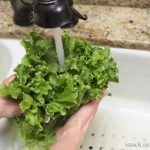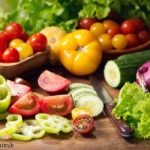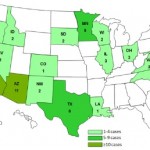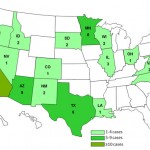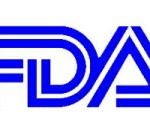The Partnership for Food Safety Education held a webinar earlier this month all about handling produce and food safety. Dr. Linda Verrill of the FDA's Center for Food Safety and Applied Nutrition (CFSAN), Ashely Eisenbeiser of Food Marketing Institute, and Ellie Krieger, author and nutritionist, were the speakers. Today we will tell you about Dr. Verrill's information and advice. Dr. Verrill spoke about studies and surveys conducted by CFSAN about produce handling and safety. She said that 14 pathogens represent over 95% of annual illnesses and hospitalizations in the U.S. And five of those pathogens are responsible for more than 90% of the health burden: Salmonella, Toxoplasma gondii, norovirus, Listeria monocytogenes, and Campylobacter. In fact, Salmonella and produce is in the top 5 … [Read more...]
Salmonella and Listeria Produce Field Contamination Risk Factors
Red and green bell peppers have been recalled in California for possible Salmonella contamination. That makes this study even more relevant. Applied and Environmental Microbiology has published research about identified risk factors associated with contamination of produce fields with Salmonella and Listeria monocytogenes bacteria. The study found that management practices are crucial to development of effective Good Agricultural Practices (GAPs). Twenty one produce farms in New York state were visited over a five week period for this study. Soil, draw swab, and water samples were collected. In addition, field-management practices were recorded. They found Salmonella in 6.1% of fields, and Listeria in 18.5%. Most of the pathogen-positive water samples were from non-irrigation surface … [Read more...]
Food Safety Myth: Pre Packaged Produce Doesn’t Need Washing
and the Partnership for Food Safety Education have been educating the public about food safety myths and facts for years. Food Poisoning Bulletin recently attended one of their webinars where they addressed those myths. Their latest is: pre packaged produce doesn't need washing. The truth is that you must read the label first to make sure it says "ready to eat", "washed" or "triple washed". If the label does not say that, wash your hands, then rinse the product under running tap water. Scrub firm fruits and veggies, such as melons and cucumbers, with a clean produce brush. Dry with a clean cloth or paper towel to further reduce germs. Cooler water is better than hot for helping the product keep quality. While you can reduce some pathogens on leafy greens by using a vinegar-based … [Read more...]
FDA Tips On Washing Fruits and Veggies
September is Food Safety Month and the U.S. Food and Drug Administration (FDA) has compiled some tips on washing fruits and vegetables. Safe handling a preparation of fresh produce can reduce the risk of food poisoning which affects 48 million people every year. At the store, choose produce that isn’t bruised or damaged. Pre-cut items, such as bagged salad or sliced fruit should only be purchased if they are refrigerated or on ice. At home, use a workspace where everything, including countertops, cutting board and utensils, are clean. Wash your hands for 20 seconds, long enough to sing Happy Birthday twice, with warm running water and soap before and after preparing fresh produce. Throw away the outermost leaves of a head of lettuce or cabbage. Cut away damaged or bruised areas … [Read more...]
FDA Researches Salmonella Contamination in Tomatoes
After 15 multistate outbreaks of Salmonella food poisoning linked to raw tomatoes from 1973 to 2010, the Food and Drug Administration (FDA) is researching the fruit's vulnerability to the bacteria. Twelve of those outbreaks have occurred since 2000, resulting in almost 2,000 illnesses and three deaths. Dr. Eric Brown, director of FDA's Division of Microbiology said, "the conditions in which tomatoes thrive are also the conditions in which Salmonella thrive. But the tomato always presented an extra challenge because it is so short-lived. By the time it looked like contaminated tomatoes could be causing illnesses, the harvest would be gone." Government scientists are trying to figure out how to reduce contamination early in tomato production. What can be done to prevent contamination … [Read more...]
Salmonella Outbreak Linked to Imported Cucumbers Grows
The Salmonella Saintpaul outbreak linked to cucumbers imported from Mexico has grown to include 81 people in 18 states. That is an increase of 8 new cases since the end of April. Sixteen people have been hospitalized, and there are no deaths reported. The outbreak numbers by state are as follows: Arizona (11), California (28), Colorado (1), Idaho (2), Illinois (3), Louisiana (1), Massachusetts (1), Maryland (1), Minnesota (9), Nevada (1), New Mexico (2), North Carolina (3), Ohio (3), Oregon (2), South Dakota (2), Texas (6), Virginia (3), and Wisconsin (2). The new cases are in Arizona, Minnesota, North Carolina, Ohio, and Virginia. Illness onset dates range from January 12, 2013 to April 19, 2013. The patient age range is from less than 1 year to 89 years, with a median age of 27 … [Read more...]
Salmonella Saintpaul Outbreak Linked to Imported Cucumbers
The Centers for Disease Control and Prevention (CDC) has announced an outbreak of Salmonella Saintpaul that is linked to imported cucumbers. So far, 73 people in 18 states have been sickened. Fourteen people have been hospitalized. There are no deaths and no recall has been issued relating to this outbreak. On April 24, 2013, the FDA placed Daniel Cardenas Izabal and Miracle Greenhouse of Culiacán, Mexico on an Import Alert. That means cucumbers from those facilities will not be allowed into the United States unless the suppliers show they are not contaminated with Salmonella. There is no evidence that contaminated cucumbers supplied by those firms are still in the marketplace. The patients by state are as follows: Arizona (9), California (28), Colorado (1), Idaho (2), Illinois … [Read more...]
FDA Extends Comment Period on Produce Safety Rule Again
The FDA has announced it will extend the comment period for the Food Safety Modernization Act's produce safety rule beyond May 16, 2013. The deadline will most likely be extended for another 120 days. The extension is in response to multiple requests from interested parties. This is the second time the comment period has been extended from the original deadline of February 15, 2013. Earlier this month, the FDA also extended the comment period for pilot programs that trace food from farm to table. FDA Commissioner Margaret Hamburg told a U.S. Senate agriculture appropriations subcommittee hearing that "we appreciate that these are complex rules to go through and we do intgent to extend the comment period so we can go through all the concerns and address them fully. I think it's a … [Read more...]
Questions and Answers on New Food Safety Rules
The Food and Drug Administration (FDA) has released a Q&A on new food safety rules for the Food Safety Modernization Act (FSMA). The questions about the produce rule cover product tracing, record keeping requirements for high risk foods, the scope of the rules, and information about laws, regulations, and guidance documents. And the rules for current good manufacturing practices and Hazard Analysis and Risk-Based Preventive Controls for Human Food cover compliance, fees, inspections, and recalls. Traceability is crucial when there's a foodborne illness outbreak. And since many outbreaks were linked to produce in the last few years, tracing this type of food is important to outbreak control and prevention. Product tracing documents the "production and distribution chain of products … [Read more...]
Should You Wash Your Food?
The USDA has put out a food info sheet about safe food handling and washing food. Does this practice promote food safety? Since we're told to wash our hands before preparing food, and utensils and pots and pans, it seems logical that washing food makes it safer to eat. Unfortunately, that's not true. Washing raw poultry, beef, pork, lamb, or veal before cooking it isn't recommended. The bacteria on these foods can aerosolize under the water, spreading three feet in all directions from your sink. That means it can get on your face and lips. Lick your lips once, and you may ingest pathogenic bacteria. In addition, some bacteria are tightly attached to the meat, so you can't remove them by washing. Cooking to a safe internal temperature is the only way to kill these bacteria. Brining … [Read more...]
